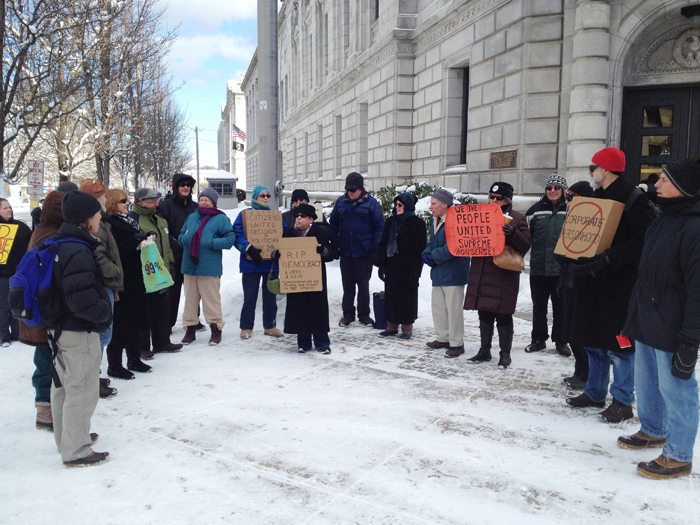NEW YORK — An elaborate plan to Occupy courthouses in cities across the nation started off quietly today, with only a few dozen demonstrators turning out to protest a landmark U.S. Supreme Court decision that removed most limits on corporate and labor spending in federal elections.
Move to Amend, the grassroots coalition that organized the event, said protesters in more than 100 cities would launch petition drives to gain support for a constitutional amendment that would overturn a 2010 court ruling that allowed private groups to spend huge amounts on political campaigns with few restrictions. Occupy Wall Street activists have joined forces with the group.
Occupy Maine joined the national effort with a noon rally at the U.S. District Court on Federal Street in Portland. About three dozen protesters turned out to chant and hold signs.
In Washington, D.C., only about 150 protesters made an appearance this morning outside the U.S. Supreme Court, a small crowd compared to the average protest in the nation’s capital. About two dozen protesters drew occasional honks from passing drivers as they stood outside Baltimore’s federal courthouse with signs that read: “Corporations are not people, Money is not speech,” and “B-heard: Corporate money out of politics.”
A demonstration of about 100 people outside the federal courthouse in Minneapolis included chants and street theater. One skit included a judge who performed a marriage ceremony between a person and a corporation.
In Albany, about 50 demonstrators carried placards and a cardboard coffin labeled “Democracy RIP.” And several dozen protesters in Denver went inside the Capitol to meet lawmakers after the protest.
In San Francisco, several protesters chained themselves to the front doors of Wells Fargo’s corporate headquarters and linked arms to prevent people from going inside a Bank of America branch. No arrests have been reported so far.
But in St. Louis, just four people showed up for a planned gathering outside of City Hall. They hung around for several minutes before leaving without a rally. Those who did attend blamed the frigid weather — blustery winds and temperature in the low 20s — and an apparent lack of communication.
It was a far cry from Occupy protests in the fall, when hundreds gathered around the clock at a small downtown park near Busch Stadium.
“Back in October it was easy to find out what was going on,” said 51-year-old Don Higgins of St. Louis. “You just went down to Kiener Plaza and asked somebody.”
The turnout was similarly small in Indianapolis, where protester Ken Chestek, a professor at Indiana University’s McKinney School of Law in Indianapolis, lamented the fact that only 15 people showed up for a demonstration against Citizens United v. FEC.
“When I heard the Citizens decision announced on NPR two years ago, I started screaming, ‘This is the end of the republic,'” he said. “To give corporations political power, that’s the end of democracy.”
Activists in New York scrambled to move their protest after a judge ruled Thursday that demonstrators don’t have a First Amendment right to protest in front of a federal courthouse.
Protesters had filed a lawsuit asking the judge to overturn the government’s rejection of their permit application. The permit was denied on grounds that the courthouse poses unique security concerns.
In a statement late Thursday, Move to Amend said the rally would be moved to Foley Square, near the courthouse, and that activists would focus on organizing the protests rather than appealing the ruling.
Send questions/comments to the editors.



Success. Please wait for the page to reload. If the page does not reload within 5 seconds, please refresh the page.
Enter your email and password to access comments.
Hi, to comment on stories you must . This profile is in addition to your subscription and website login.
Already have a commenting profile? .
Invalid username/password.
Please check your email to confirm and complete your registration.
Only subscribers are eligible to post comments. Please subscribe or login first for digital access. Here’s why.
Use the form below to reset your password. When you've submitted your account email, we will send an email with a reset code.